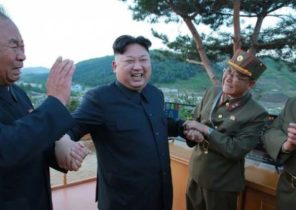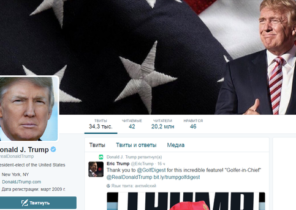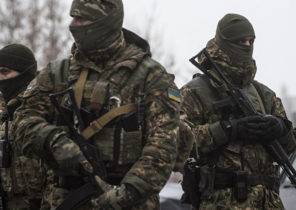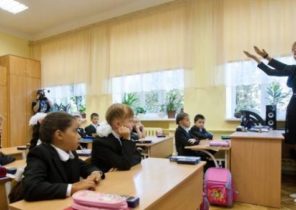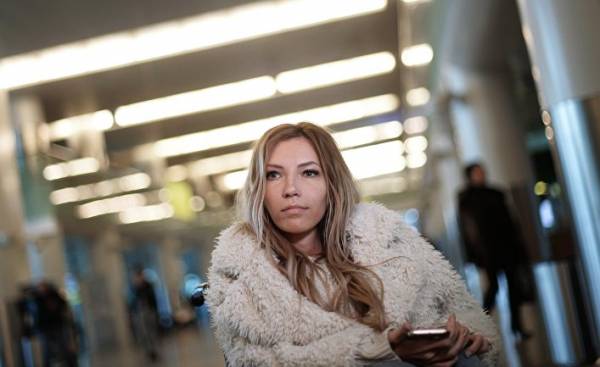
Few rules are changed, are subject to manipulation and outright violated, as the current international pop song contest “Eurovision” a ban on the use of “texts, calls or gestures of a political or similar nature”.
Over six decades of existence of the contest, anything can happen — and the world wars, the fall of the Berlin wall — but this year’s policy covered “the Eurovision” more brazenly than ever.
Made a lot of noise battle between the host country, Ukraine, and Russia culminated on Friday, when Russian television company “First channel” announced that it will broadcast the contest, which will be held next month. This move was made in response to the decision of the host country not to allow the participation of the Russian representative Julia Samoylova after it was revealed that she visited the Crimea, annexed by Russia from Ukraine in 2014, and performed there.
According to the European broadcasting Union (EBU), Russia’s decision deprived her of the opportunity to participate in the contest this year.
“We strongly condemn the decision of the Ukrainian authorities to impose a ban on entry for Julia Samoilova because we believe that this prohibition fundamentally undermines the reputation and principle of the political nature of the contest and his mission to unite all countries through friendly competition,” said Chairman of the Supervisory Board of “Eurovision” Frank Dieter Frayling (Frank Dieter Freiling).
“However, preparation for the competition in Kiev continues and is in full swing. Our priority remains held in may spectacular song contest”.
This is the first case when the host country has banned the entry of a participant from another state, and many in “Eurovision” has accused Ukraine of the fact that she politicized the competition.
However, others believe the decision to submit for competition Samoylova same political move on the part of Russia which forced Ukraine to make a choice — either to defend their laws, or to reassure the organizers and participants of “Eurovision”. Russia initially promised in the interest of peace not to select a winner who would cause controversy and only the night before the deadline for receipt of applications, she finally offered to participate Samoilov.
Ben Royston, who previously managed some of the largest information site of “Eurovision” and has repeatedly been a jury member for the selection of songs the contestants of “Eurovision”, and also worked with past teams from Sweden and Azerbaijan won the competition, said: “the Policy has always been synonymous with Eurovision, and this latest demonstration of the position was just part of a long tradition”.
Royston noted that many countries view Eurovision as a platform to promote their national identity and culture, as well as a way to assert itself as a modern political state. In 2011 Azerbaijan made a part of their national policy victory on “Eurovision”, and what did it two years later.
In previous years, the conflict between Azerbaijan and Armenia, and then between Russia and Georgia have reached the stage of the competition. In 2009, when Moscow was the host country of the Eurovision (a year after the Russian-Georgian war), Georgia recalled its party after organizers demanded that she changed the text and title of his song We Don’t Wanna Put In, because the song was deemed too explicit expression of criticism of Russian President Vladimir Putin.
Similarly, Armenia decided not to participate in the contest when it was held in Azerbaijan due to the ongoing territorial dispute between the two States, and last year the Armenian participant condemned for what she unfurled the flag of the Republic, the right to the territory which is disputed by the two countries.
However, rather than disqualify Russia for the nomination of participants, which will obviously cause dissatisfaction of Ukraine, the European broadcasting Union had proposed that Samoilov spoke via video bridge. However, this proposal was rejected and Ukraine, and Russia.
After Ukraine announced its ban on entry to Ukraine, Samoilova commented on it on air of the Russian state “the First channel”, saying that he does not understand why Kiev saw “in me, in such a small girl, some kind of threat.”
But, according to Royston, “the real story this year is how Russia manipulated the situation to politicize the contest.”
He said, “They chose a contestant in a wheelchair, which was published in social networks Pro-Russian statements on the Crimea. She would never be allowed to come to Ukraine, but they still chose her. And now Russia has publicly stated: “How can the Ukraine do to this poor little girl in wheelchair victim of its laws?” No doubt, all this is part of the Russian PR machine”.
Russia, however, argues that the choice Samoilova in the spirit of Eurovision, practicing diversity, and the decision not to issue her a visa “seriously devalues the upcoming competition.”
Russia as a country that contributes a fee for participation in “Eurovision” is one of the largest financial contributors of the contest, and indicators of popularity of the broadcast of the competition here is the highest among the participating countries. However, in recent years the public service broadcaster is under pressure from various Russian politicians, demanding at all to boycott the “Eurovision” for this contest, as it seems, shares and supports LGBT values, which is contrary to the Russian laws banning “gay propaganda”.
Catherine Baker (Catherine Baker), the teacher of history of the XX century from the University of hull, studying the song contest “Eurovision”, said that it would be embarrassing and shameful if, after this last fight, the organizers decide to “prevent” policy.
“Every year, Eurovision tells us about what it means to be European, and this is a form of political communication, says Baker. One of the arguments raised by critics to the address of “Eurovision”, is that this competition is just bad taste, kitsch, and it means nothing. If you further restrict this space and taking a more assertive position in relation to what is considered political, you’re destroying something that may is focused and what is the ratio of popular music actually”.
“This ultimately will have a negative impact on competition and will play into the hands of those critics who argue that it is simply meaningless, empty entertainment.”
